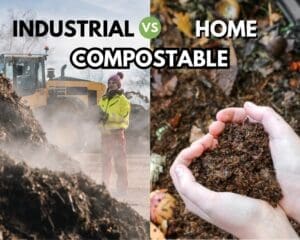Not all Compostables are Equal: Industrial vs Home Compostable
Understanding Composting and Its Benefits
In the quest for sustainable packaging decisions, composting has emerged as a viable solution. This natural process involves transforming organic materials such as vegetable scraps into nutrient-rich soil conditioner.
The benefits of composting are manifold – from environmental to economic aspects. For instance, it reduces methane emissions, which is critical in combating climate change by sequestering carbon dioxide within its structure instead of releasing it into the atmosphere.
How Composting Helps Combat Climate Change
Decomposition of organic matter in landfills releases a large amount of methane, contributing significantly to global warming. However, diverting food waste to compost bins helps reduce these harmful emissions dramatically, making this an environmentally friendly choice that diverts waste away from trash collection destined for landfills.
Apart from reducing methane emissions, another advantage offered by composting lies in its ability to act as a ‘carbon sink’. It captures atmospheric carbon dioxide within its structure, thereby mitigating global warming effects while enriching our soils with beneficial microbes and nutrients, promoting plant growth without resorting to chemical fertilizers.
Industrial vs Home Compostable
A common misconception revolves around industrially and home compostable packaging options. While both seem certified eco-friendly at first glance, there are stark differences between them that can impact your sustainability efforts.
- Industrial compostable and Oxo-degradables degrade over time when exposed to heat and light but eventually break down into microplastics – tiny fragments that pose serious threats to marine life and human health.
- Fully compostables undergo a natural process where microbes consume them along with similar organic materials like vegetable scraps, transforming them into valuable compost. They leave no harmful residues behind, ensuring reduced environmental impact compared to conventional plastic disposal methods. Additionally, they provide beneficial outcomes such as improved soil structure and fertility, as well as enhanced water retention capabilities, thereby promoting healthier plant growth without reliance on chemical fertilizers.
How to Identify the difference
Making environmentally friendly choices involves being able to identify genuine certified products. A simple way to do this is by looking out for the distinctive logo on product packaging – an indication that it’s BPI-certified.
Beyond visual cues, BPI’s official website offers an exhaustive list of certified companies offering various types of compostables – making sourcing raw materials or finished goods easier than ever before while helping you elevate your packaging decisions towards more sustainable alternatives.
Purchasing these verified items means supporting manufacturers who are conscious about their product’s full environmental journey from material sourcing through disposal helping us make better eco-friendly choices.
Sourcing Raw Materials: Hemp Plastic Alternatives
Hemp-based plastics offer one promising alternative solution towards achieving sustainability goals due to their rapid growth rate and low resource input requirements. This makes them ideal for mass production applications while minimizing negative impacts associated with sourcing raw materials from non-renewable feedstocks traditionally used in plastic manufacturing processes.
Practical Steps Towards More Sustainable Waste Management
Though the journey towards sustainable waste management may seem daunting, it is not as complex to traverse as one might expect. Here are some tangible measures that can be taken to overcome these difficulties and work towards a more sustainable planet.
1. Starting Your Own Compost Pile at Home
Making your own compost pile is an excellent way of reducing landfill contribution and creating nutrient-rich soil for gardening purposes. So, how do we get started on creating our own compost pile?
To begin with, identify a suitable spot in your yard or balcony where you can start collecting organic materials like vegetable scraps, coffee grounds, leaves, etc., into the compost bin.
Achieving the right balance between green (nitrogen-rich) materials such as food leftovers and brown (carbon-based) ones like dried leaves or newspaper shreds is essential to expedite decomposition while keeping unpleasant odors at bay. You’ll find comprehensive guidelines on home-composting here.
2. Choosing BPI-Certified Products Over Non-Compostable Alternatives
Beyond personal efforts within our homes or workplaces, advocating for sustainable practices within our communities plays an equally crucial role in promoting better waste management strategies.
This could involve encouraging local businesses to make environmentally friendly choices by choosing products certified by the Biodegradable Products Institute (BPI). By supporting establishments that prioritize sustainability over convenience, we encourage others to follow suit. Learn more about BPI certification here.
3. Educating Others About The Benefits Of Composting And Its Importance In Reducing Environmental Impact
Spreading awareness regarding the importance of composting serves a dual purpose – it helps reduce the quantity of trash destined for landfills and also enriches the quality of soil without leaving harmful residues behind, making the earth a healthier place to live.
Sharing knowledge about the true sense of biodegradability, i.e., items that decompose under certain conditions to create healthy compost, versus misleading claims often seen on packaging labels, further reinforces understanding around what truly constitutes “bi
Composting is a game-changer in sustainable waste management. It reduces methane emissions, acts as a ‘carbon sink’, and promotes soil health – all while saving money on commercial fertilizers. In essence, it’s an eco-friendly way to turn trash into treasure.
Compostable products, unlike oxo-degradables, are a game changer in sustainable waste management. They decompose quickly and turn into nutrient-rich soil conditioner without leaving harmful residues behind. Additionally, hemp-based plastics present an eco-friendly alternative to traditional plastic manufacturing.
Look for BPI certification when buying compostable products to ensure they meet industrial standards and decompose efficiently. This not only supports eco-conscious manufacturers but also helps reduce landfill waste, create healthy soil, and lower methane emissions. Remember, your purchasing choices can influence broader environmental policies.
Starting a home compost pile, advocating for BPI-certified products, and educating others about the benefits of composting are practical steps towards sustainable waste management. These actions reduce landfill contributions and promote an eco-friendly world.

